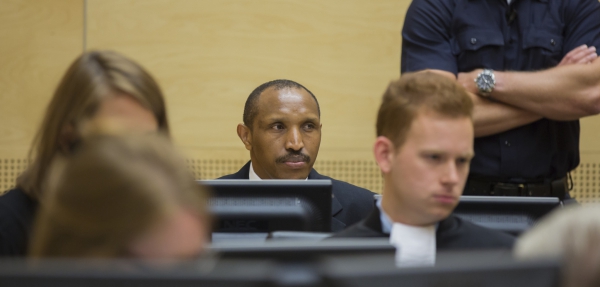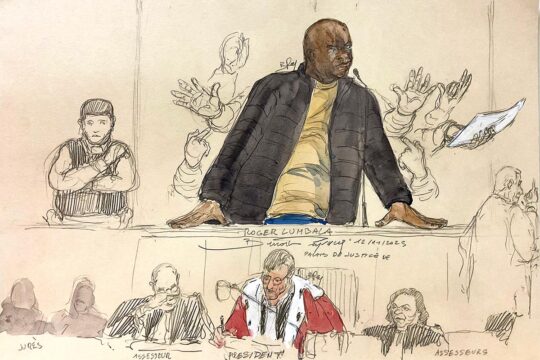Former Congolese militiaman Bosco Ntaganda has been testifying in his own defence since June 14 before the International Criminal Court (ICC). He is on trial for crimes against humanity and war crimes committed in Ituri, eastern Democratic Republic of Congo (DRC) in 2002 and 2003, when he was second in command of the Union of Congolese Patriots (UPC) militia. The Prosecution says his military campaign caused the deaths of some 60,000 people. But Ntaganda told the court he protected civilians.
Ntaganda is trying to paint a rather romantic self-portrait. “I am not guilty of anything,” he told the ICC judges on the second day of his testimony. “I am not a criminal, I am a revolutionary.” The ex-deputy military commander of the UPC is trying to show he is not the “Terminator” that his enemies call him and as he has been described by 71 prosecution witnesses called to testify since the trial opened in September 2015. Although Ntaganda appeared nervous on the first day of his testimony, he is now in full flood as he recounts his wars.
Marked by the Rwandan genocide
Bosco Ntaganda was born in Rwanda in 1973 and baptised Enias. He was raised by his grandparents in neighbouring Congo (then called Zaire), after colonial power Belgium “separated fathers from sons”. At 17, he answered a call to arms by the Rwandan Patriotic Front (RPF), a rebel movement formed by Tutsi refugees in Uganda that dreamt of taking power in Kigali. Speaking Swahili with a Rwandan accent, Ntaganda told the court that he “liked the army” right from the start. Deputy-lieutenant Ntaganda told how Kigali was taken in July 1994, when the RPF chased out the genocidal regime and took power in Rwanda. And he described the horror. “There were corpses everywhere, piled up along all the roads,” Ntaganda recounted. “There was a very strong smell, and the dogs were there” eating the bodies. Officer Ntaganda was one of the liberators, but the genocide made him want to pursue a career as a fighter. It became a driving force for all his battles, the battles of a scarred man who also spoke of his sister burned in her house with her son. At this point, Ntaganda took a Kleenex to wipe his dry eyes and asked his lawyer to move to other questions.
Getting rid of Mobutu
Lawyer Stéphane Bourgon is also an ex-officer. He portrayed his client as a professional soldier. But apart from a few months in the Congolese army towards the end of his career, Ntaganda spent more than 20 years in different militia groups. After the Rwandan genocide ended, he says he “really wanted to join rebels to unseat the dictator” Mobutu Sese Seko, and so he returned to Zaire to join the AFDL movement of Laurent Désiré Kabila. Mobutu was overthrown in 1997, but the new regime quickly lost the support of its Rwandan and Ugandan sponsors and Ntaganda told the court that Tutsis in Congo were persecuted. “They spoke of us as if we were vermin,” he said. “Kinshasa called for Tutsis and anyone like them to be killed.” So Ntaganda decided to continue his career as a militiaman, this time to fight against the new regime. In the early 2000s he went to Ituri, about which he spoke with the aid of a map. For several long minutes he annotated a map of Bunia, provincial capital of Ituri, on an electronic screen to show the positions of armed groups, where he lived, the Ndromo camp, headquarters of the Congolese Patriotic Army (APC) and other strategic places. Thus he tried to explain events that took place 15 years ago. Despite requests from the prosecution and defence the judges have refused to go to the crime sites some 7,000 kilometres from the ICC courtroom.
“They said I was an assassin”
In Kisangani, Ntaganda formed a battalion of the Congolese Patriotic Army (APC), but then was injured and returned to Ituri in the early 2000s, but says he was threatened and always carried a gun at his waist, hidden under his uniform. He told the court that his former associates of the Congolese Democratic Alliance (RCD-KML) and their boss Ernest Wamba dia Wamba were after his blood. He told of a woman who came to inform him of a plot devised by a certain Patrick. “He said he is going to eliminate you,” she told him. This Patrick was an Interahamwe [militia that played a big role in the Rwandan genocide and then fled to eastern Congo], Ntaganda told the court, asking that the hearing then be moved behind closed doors. When it resumed in public, the onlookers understood that Patrick had been killed, but without knowing by whom. Ntaganda railed against the campaign his enemies launched against him. “They said I was an assassin, that a Rwandan was an assassin,” he said. “That was put about widely. I think even the people in Ituri who didn’t know me heard my name. They called me an assassin, assassin, assassin. I didn’t even know that term in French before.”
Trained in the bush
Ntaganda says “revolution” was calling. “I was ready for guerrilla warfare,” he said. So with others he went into the bush and formed the Chui Mobile Force (Chui means leopard in Swahili), whose aim he says was to bring Ugandan forces supported by Kinshasa who had been occupying the region since 1997 to the negotiating table. “There were about 150 or 200 of us,” he said. “We had to move like leopards. But we were all soldiers, there were no civilians. When we went into the bush, civilians heard about it and started to bring us food.” The rebels apparently had a feast. “There was everything, food and drink,” he told the court, including meat, rice, and whisky for those who drank. But he says he remained sober. “Why this support from the population?” asked lawyer Bourgon. “In a month of being in the bush, Chui never looted people’s property nor touched a single civilian,” Ntaganda answered. “Our aim was to help the civilian population, but our enemies had a different ideology.” These enemies were defeated and the legend of Ntaganda’s powers spread throughout the region, he claims. Divine powers? Drugs? Ntaganda paints himself as more rational. “I trained as a guerrilla and I learned the strategy to defeat large numbers of the enemy,” he told the court. At The Hague, Ntaganda now has another enemy, for after the questioning from his lawyer, due to continue this week, he will face cross-questioning from the Prosecutor.






